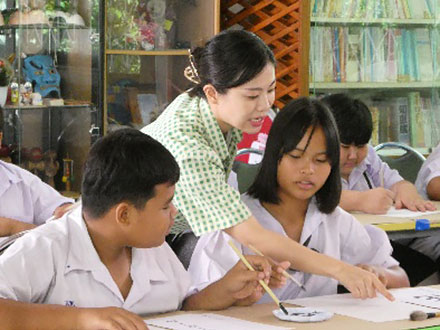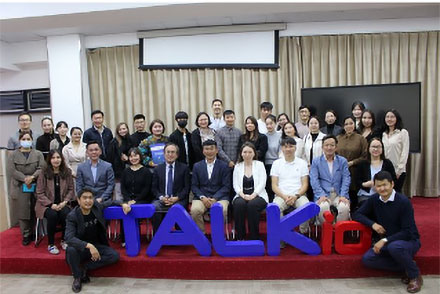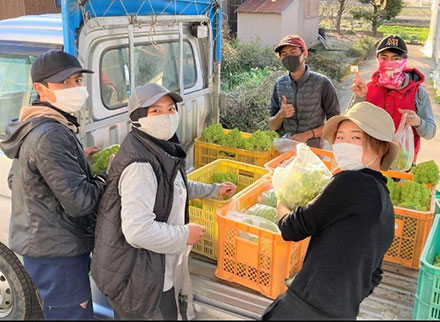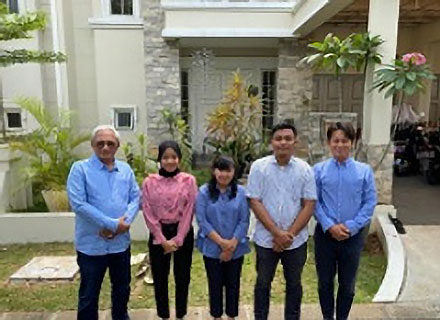Objectives
- Enhance capacity development so that migrant workers can contribute to “Quality Growth” of their countries of origin.
- Contribute also to economic growth and social development of Japan by helping Japan address labor shortage due to low birth rate and aging population, secure talents who can facilitate co-creation and innovation of technologies needed to solve social issues, and build networks with overseas businesses and global talents to promote trade and investment.
Policies
- Under JICA global agenda for related sectors and using various programs, JICA helps migrant workers in their effort to contribute to the economic growth of their countries of origin using the skills and the networks they acquire in Japan.
- JICA global agenda
- JICA supports effective migration based on a strong match of skills of workers with the needs of the Japanese society. To this end, JICA supports identification of skills and needs, collaboration among stakeholders, dissemination of accurate information, development of relevant policies and systems, and human resource development (including pre-departure Japanese language education), among others. JICA also works to expand opportunities for migrant workers to play more active roles after their return to their return to their counties of origin.
JICA ACTIVITIES
Support for capacity development and promotion of “strong match” migration
Bangladeshi ICT HRD and Employment support: Project for Securing Highly Skilled HRs through Industry-Government-Academia Collaboration in Miyazaki City
Bangladesh-Japan ICT Engineers' Training Program (B-JET), which was launched as part of JICA's technical cooperation project, has been promoting the employment of highly-skilled foreign talents with local government, university, and private companies in Miyazaki. It includes activities such as Japanese language education, arrangement of internships, and improvement of working and living environments. While handling of B-JET was taken over by the Universities in Miyazaki and Bangladesh in 2021, JICA Partnership Program "Miyazaki-Bangladesh ICT Human Resource Development Project" (B-MEET) was launched in 2022. The project targets to further promote economic exchanges between Miyazaki and Bangladesh.
In collaboration with local universities and private sectors, we are going to consolidate the sustainable relationship between Miyazaki and Bangladesh by activities such as Japanese language training and encouraging collaboration between local private companies and Miyazaki.

- MANGA edition: Regional revitalization in Japan Brought about Bangladesh IT Professionals 230130_JICA_Bangladesh_EN
- Project History Book Launch: New ODA Approach Initiated in Bangladesh and Miyazaki - JICA Ogata Research Institute
- Signing of Minutes of Meeting on JICA Partnership Program with Bangladesh: Establishing a model to promote economic exchange between Bangladesh and Miyazaki, Japan | Bangladesh | Countries & Regions | JICA
- Bangladeshi IT Engineers in Regional Japan: International Cooperation That Fills Needs in Both Countries | News | News & Features | JICA
Cooperation in Japanese language education in developing countries through Japan Overseas Cooperation Volunteers

JICA dispatches Japan Overseas Cooperation Volunteers (JOCVs) based on requests from developing countries. JOCVs are selected from applicants who are willing to utilize their skills, knowledge, and experience for the benefit of developing countries. "Japanese language education” is one of more than 180 different types of technical fields of JOCVs.
Since the launch of the program in 1965, JICA has dispatched more than 3,300 volunteers for Japanese language education. They have been contributing to increase the number of people with an affinity for Japan, nurturing Japanese-language professionals and skilled and industrial talents, as well as strengthening of ties with the Nikkei community in Latin America.
Recently, there is an increasing number of requests for JOCVs in Japanese language education from engineering and technical universities, polytechnics, and vocational training institutions with prospects of working in Japan or at local branches and subsidiaries of Japanese companies.
After returning to Japan, they are working on creation of an inclusive society in Japan by providing Japanese language education in their communities and educating children with foreign connections.
Support for those interested in working in Japan through the Mongolia-Japan Center

JICA supports people who have aspirations to work in Japan by providing them with correct information on living and working environments in Japan and helping them prepare for work in Japan through the "Japan Centers" located in Cambodia, Vietnam, Laos, Myanmar, Mongolia, and Kyrgyzstan.
The Mongolia-Japan Center for Human Resources Development (Mongolia-Japan Center) is one of these centers. As an initiative in cooperation with Japanese municipalities, the Mongolia-Japan Center, together with the Ibaraki Prefecture Foreign Worker Support Center and JICA Tsukuba, holds events for Mongolian human resources to prepare for working in Japan.
Creating a sustainable cycle of "strong match" migration
Taya Farm (Fukui) x Indonesia
Project on promoting human resource circulation through support
for Technical Intern Trainees (TITs) in starting farming/businesses on their return in Indonesia

The Ministry of Agriculture of Republic of Indonesia greatly expects the Technical Intern Training Program (TITP) to give Indonesian intern trainees an opportunity for improvement of their technical skill on agriculture and to foster young farmers contributing to development in Indonesia. However, many technical intern trainees can hardly make use of funds and experiences they obtained from their internship after returning to their home countries. In addition, the curriculum of pre-departure training provided to trainees by the Indonesian Centre of Agricultural Training (ICAT) under the Ministry of Agriculture is limited to Japanese language education and basic agricultural techniques. It is insufficient as a capacity development of those farmers who contribute to future agricultural development in Indonesia.
NOUEN TAYA (TAYA farm) in Fukui Prefecture has accepted technical intern trainees from Indonesia for long years. Under the JICA Partnership Program, TAYA farm works on improving the environment for dispatching and accepting trainees and supporting the trainees’ career development in their home countries. (The project on promoting human resource circulation through support for TITs in starting farming/businesses on their return in the Republic of Indonesia)
The objective of the project is to enable technical intern trainees to utilize the experience and funds gained from their internship to join farming or start their own businesses and grow into human resources who play a key role in the development of local agriculture and economy. The project enriches training and follow-up programs and improves teaching capabilities for technical intern trainees by ICAT.
Enhancing capacity development that leads to greater business opportunities abroad.
Combining Overseas Expansion and Human Resource Development
-SUGAWARA Industry (Tohoku Region): Project to circulate human resources with Indonesia

Utilizing JICA’s scheme to support SMEs in expanding their business abroad, Sugawara Industry Co., Ltd. in Miyagi prefecture conducted a field survey for the business development of sustainable pavement management utilizing recycled asphalt in Indonesia, and strengthened its foundation of overseas activities. Since 2023, observing that dissemination of the technology requires updating pavement management methods and laws and regulations, Sugawara Industry is preparing a proposal to introduce a recycle-oriented pavement technology that suits to the environment of Indonesia, as well as planning to assess its profitability, in cooperation with JICA.
In parallel, Sugawara Industry is accepting technical intern trainees from Indonesia, with a view of to hire them as group leaders at its local subsidiary after they complete their training, as well as at its HQ in Japan.




scroll